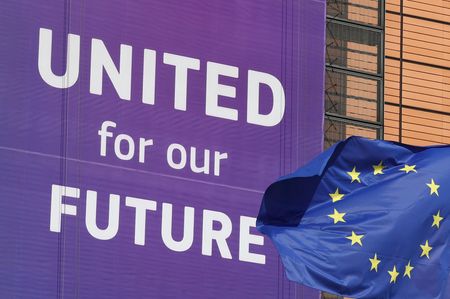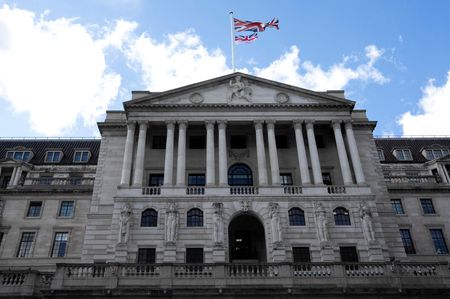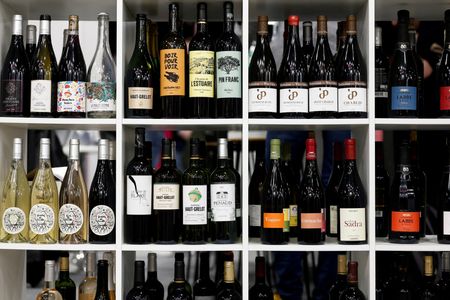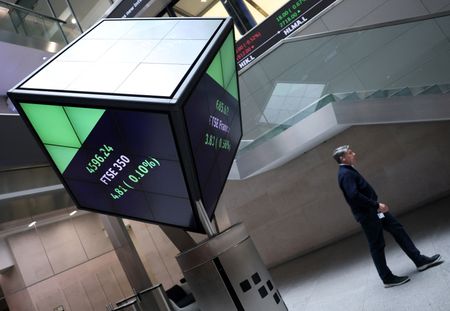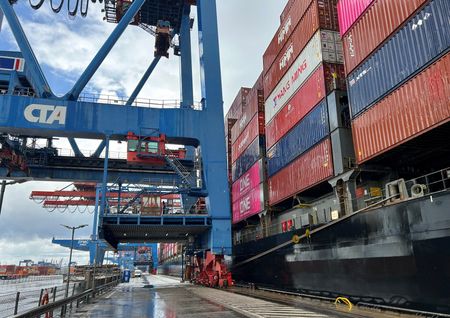By Jan Strupczewski and Karol Badohal
WARSAW (Reuters) -With higher U.S. tariffs postponed by 90 days, European Union finance ministers pledged unity on Friday in negotiating a trade deal with Washington during that window, noting the U.S.’ levies were more hurtful for its own economy than for Europe’s.
U.S. President Donald Trump said on Wednesday he was suspending for 90 days the reciprocal tariffs of 20% he had imposed on Europe on from that day, though his 10% rate remains in place as it does for most other countries globally.
“All finance ministers agreed on the need for a unified stance,” the chairman of the talks Paschal Donohoe told a news conference, as EU finance ministers met in Warsaw for talks for the first time since the tariff announcement.
EU Economic Commissioner Valdis Dombrovskis told reporters the Commission estimated the negative impact of U.S. tariffs on the European economy at 0.2% of GDP by 2027 if the measures were only temporary and there was no retaliation.
But if companies started perceiving the higher tariffs as permanent, or if there was more retaliation to them, European economic growth could lose 0.5%-0.6% of GDP by 2027, he said.
At the same time the U.S. economy itself would be reduced by 0.8% to 1.4% until 2027 in the benign scenario and 3.1%-3.3% in a scenario of permanent tariffs and more retaliation.
“These model simulations do not account for an additional loss of investor and business confidence in the U.S. economy, which would further the negative GDP impact,” Dombrovskis said.
He said that, by contrast, increased investment in Germany, which has reformed its debt brake to spend more freely on defence and created a 500 billion euro infrastructure fund, could provide a positive stimulus for the European economy.
Some European Central Bank officials were more pessimistic and estimated the impact of the U.S. tariffs on the EU economy at between 0.5% and 1.0% of GDP, depending on how the trade dispute develops. The Commission has forecast the EU economy as a whole would grow 0.9% this year, so the tariffs could put the EU in recession.
“It is very difficult to put figures on it now, but it is obvious that global trade difficulties will affect growth ..in the euro area,” Donohoe told Bloomberg TV.
EU’S OWN MARKET A PRIORITY
The ministers agreed that the trade turbulence called for more urgent action to make the EU’s own internal market of 450 million consumers work better.
This could include more urgency in the introduction of a digital euro, the creation of the EU’s savings and investment union and trade diversification to make the European Union less dependent on the U.S.
The International Monetary Fund has estimated that internal EU barriers to trade were equivalent to a 44% tariff on goods and 110% tariffs on services within the bloc.
“We need to use the 90 days wisely, we need a good deal for European citizens and for European companies,” Polish Finance Minister Andrzej Domanski said.
Ministers also made clear the EU was ready to retaliate.
“The U.S. side has to be aware that if the negotiations don’t work, we will have another discussion around the response mechanisms,” German Finance Minister Jorg Kukies said.
Negotiations with Washington on how to avoid higher tariffs altogether are handled by the European Commission, which is in charge of trade policy for the 27-nation EU.
If a deal can be agreed within the next three months, possibly along the lines of the EU’s zero-tariff proposal on all industrial goods, the issue would be resolved.
But a no-deal outcome is also possible. That would leave the job of shielding national economies and industry sectors in the hands of the 27 EU governments.
The sectors at greatest risk from U.S. tariffs are steel, aluminium, cars, timber, microchips and pharmaceuticals. U.S. tariffs of 25% are already in place on EU steel, aluminium and cars.
Coordination of industry support will be key because some governments have stronger public finances and can afford to help their companies while others cannot. Such inequality would distort fair competition in the single EU market.
(Additional reporting by Benoit van Overstraeten, Karol Badohal, Pawel Florkiewicz and Lewis Macdonald; Reporting by Jan Strupczewski; Editing by Jamie Freed and Hugh Lawson)

